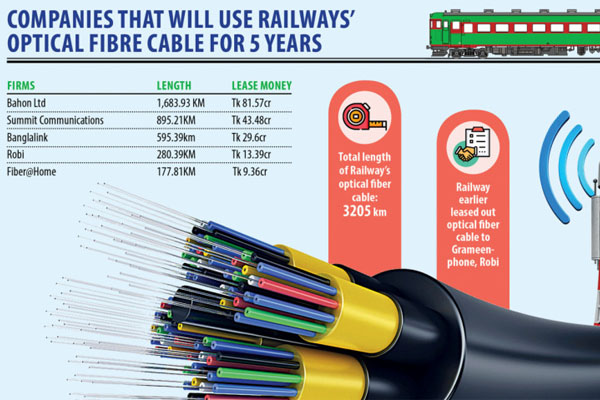5 telcos, ISPs to use railway’s optical fibre; faster internet likely

Bangladesh Railway has leased out its spare optical fibre cables to five telecom and internet service providers for five years, a move which is expected to ensure faster internet speed for end users.
Through the deal, the railway will earn Tk 177.81 crore during the period.
The companies signed agreements with Bangladesh Railway through a ceremony at Rail Bhaban yesterday. Railways Minister Md Nurul Islam Sujan was present as chief guest.
Under the agreement, Bahon will use an optical fibre network of 1,683.93 kilometres, Summit Communications 895.21 kilometres, Banglalink 595.39 kilometres, Robi 280.39 kilometres, and Fiber@Home 177.81 kilometres.
"We will expand our network through the railway's robust network. Customers will get faster internet," said Rashed Amin Biddut, chief operating officer at Bahon, a nationwide telecommunication transmission network (NTTN) operator.
An NTTN operator provides data service by deploying optical infrastructure for internet service providers, internet gateway service providers and telecom operators.
"We will expand our network through the railway's robust network. Customers will get faster internet," said Rashed Amin Biddut, chief operating officer at Bahon, a nationwide telecommunication transmission network (NTTN) operator
"The fibre of the railway is solid and they don't get damaged, allowing us to provide a better price," Biddut added.
With the new 1,683.93 kilometres from the railway, the total optical fibre network of Bahon would stand at 3,000 kilometres.
Md Arif Al Islam, managing director of Summit Communications, said Summit already has a strong optical fibre network of about 50,000 kilometres.
"We have taken a new 895 kilometres of optical fibre network from railways to ensure better redundancy."
Fiber@Home, which has a total of 50,000 kilometres of optical fibre network across the country, took 178 kilometres under this deal from the railway mainly as a backup, said its chief technology officer, Sumon Ahmed Sabir.
However, it's unclear how much telecom operators Robi and Banglalink will benefit from this deal since telecom operators cannot import or install dense wavelength-division multiplexing (DWDM), an essential technology device to maximise the use of optical fibre.
In Bangladesh, only NTTN operators can import or install the DWDM technology.
"Without the DWDM, fibre networks can give little benefit to a telecom operator," said an official of a telecom operator.
Mohammed Shahedul Alam, Robi's chief corporate and regulatory affairs officer, said the railway assured them that it would install DWDM for the telecom operators.
"So, with the newly leased network of optical fibre, we will be able to fiberise more of our network site."
In 2017, the railway leased out 2,190 kilometres of optical fibre network to Robi. But, Robi officials said they could not use those due to the bar on importing the DWDM.
Earlier, the railway leased out 2,071 kilometres of optical fibres to Grameenphone.
The operator is using these fibres since it was able to import and install the DWDM at that time. The bar on installing the DWDM by telecom operators was issued in 2018.
However, a Grameenphone official said the lifespan of many of the DWDM devices had expired and many of them were now damaged. So, they do not get expected benefits out of the fibre network of the railway, said the official.
Erik Aas, chief executive officer of Banglalink, said they were happy to enter into this partnership with Bangladesh Railway for the optical fibre sharing initiative, which would enhance the operator's connectivity and quality of digital services across the country.
"Banglalink will always remain open to such opportunities considering their far-reaching impacts on the telecom industry and the country as a whole," he said.
Bangladesh Railway recently completed a project involving 583 kilometres of optical fibre cable along rail lines, taking its total length of optical fibre-based telecommunication network to about 3,205 kilometres.
After obtaining an NTTN licence from Bangladesh Telecommunication Regulatory Commission in 2014, Bangladesh Railway availed the legal validation to lease out fibre optical networks to internet and telecom services operators.
Banu Ranjan Sarkar, chief signal & telecommunication engineer (telecom) of Bangladesh Railway, and Perihane Elhamy Ahmed, chief technology officer at Robi Axiata, were present at the deal signing ceremony.
ক্যাটেগরিঃ Tech & Startup,
ট্যাগঃ 5 telcos



